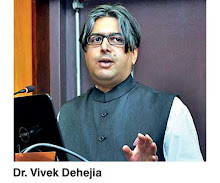Now, here's the irony. The point above is well known, and was made many times by libertarians such as Hayek, who was suspicious of mathematical modelling of the economy (whether of the classical or Keynesian varieties). To him, it was a slippery slope from a model to scientific socialism, to the notion that the economy is a machine that can be fine tuned and managed. In other words, the context in which the market operated was important, and, for Hayek and those of his ilk, that had to be a liberal society. But yet it's now often the folks on the libertarian end of the spectrum who forget this point, and imagine somehow that the economy can be disengaged from the rest of society, and the state, in which it's embedded, when they engage in discussions of the "free" market. Let's henceforth banish this term, and talk if we wish of a "minimally regulated market". It's less sexy, but more realistic, and will keep us honest about what's involved.
Monday, March 9, 2009
The market and the state: Postscript, and a further irony.
One point I didn't bring out sufficiently in my last entry was in my discussion of the "free market", and how this is a misleading metaphor for how the market economy operates, which is always in tandem with the state. Now, Orwellian newspeak and ideological fervour may be two reasons. But yet another is the way that economics is taught nowadays, and for the last while. At least the last seventy years or so, since Paul Samuelson's Foundations and the Arrow/Debreu theorem. We teach our students based on stylized mathematical models devoid of any institutional detail or richness. So that in the model, whether partial or general equilibrium, the price system operates to get us to the equilibrium, without having to worry about niceties like property rights and contracts being enforced. So it's very easy to slip into a mode of thinking that the market functions on its own, if one thinks of the economy purely based on these stylized models.
Subscribe to:
Post Comments (Atom)

No comments:
Post a Comment